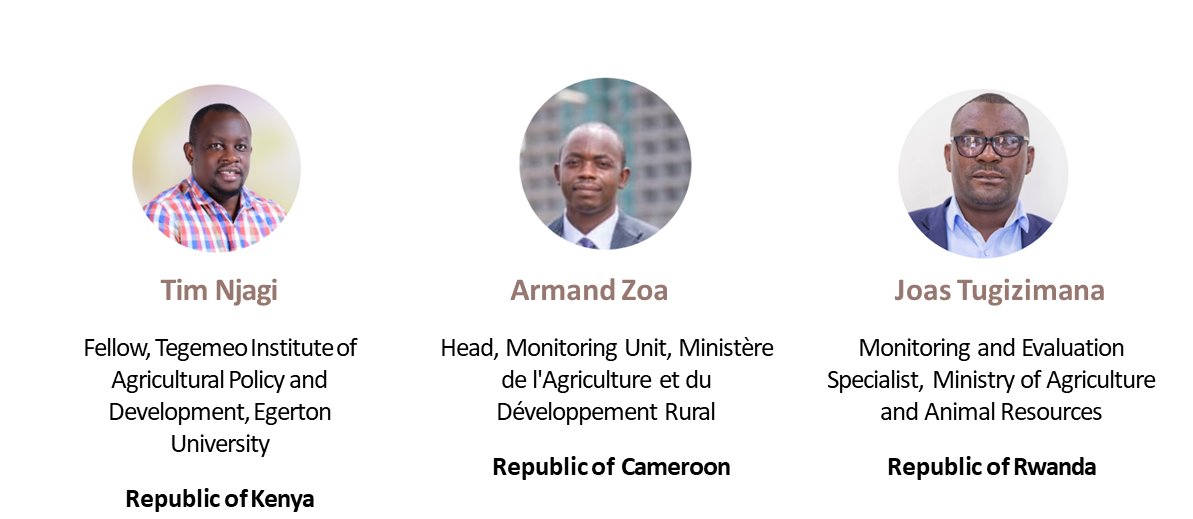All three underscored the importance of data quality in the sector, from calculating food security deficits, food production, and consumption, to more commercial uses and decisions such as trade, pricing and marketing. As the discussion progressed, what became clear is that countries with stronger management information systems (MIS) for agricultural data are coping better with the adverse impacts of COVID-19 on data quality than those with less established systems. Evidence for this can be drawn in two main areas: harmonisation of national data systems and presence of long-term systematic data.
Harmonised, national data systems strengthen quality
Rwanda has a state-owned MIS, centrally managed and cascading to the district level. The country has a robust results-based management system in which performance contracts are signed between the Ministry of Agriculture and Animal Resources (MINAGRI) and various institutions and their staff as a commitment to implement and report on time-bound targets. The MINAGRI MIS generates survey reports alongside a functional M&E platform. Data quality is verified through field visits conducted across the country on a quarterly basis, and digital platforms like crop monitoring system are in place. Budget cuts to redirect funds to the COVID-19 response have resulted in limited monitoring and verification visits, potentially compromising data quality, albeit to a limited extent. Because of its relatively robust processes and systems, the country seems to grapple less with the financial cuts and travel restrictions posed by COVID-19.
Kenya is beginning to see traction in harmonised national data systems and corresponding improvements in data quality, predominantly through interventions spearheaded by overseas development assistance (ODA). These include the Global Open Data for Agriculture and Nutrition (GODAN), the CGIAR Big Data platform and Africa Development Bank investments supporting member states to harmonise methodologies and data collection tools. Although not centrally managed, such initiatives have made strides in enhancing data quality and availability, more so in the context of COVID-19 related travel restrictions. As a back-stop measure, during lockdown, there has been elevated use of remote data collection methods, for example through satellites, phone or SMS surveys.
Cameroon’s Ministère de l’Agriculture et du Développement Rural (MINADER) data management system is less harmonised and typically based on estimates that are neither verified nor substantiated. It is quite typical for different government ministries to make decisions on a common agricultural intervention based on different estimate figures. The COVID crises has enhanced the interest of policy makers in agriculture and food security data, in the effort to prevent the health crises deteriorating into a food crisis. This renewed interest could support efforts to improve harmonisation of agricultural data systems.
Long-term, systematic data collection enhances quality
Kenya has an established database with panel data over long periods and a large sample of respondents that are familiar with the system. In addition to familiarity, respondents have some level of trust in both the system and data collectors which arguably enhances data quality and responsiveness. The country already has comprehensive data sets on household demographics, periodic data on food availability, pricing and fluctuations during different seasons, making it less cumbersome for researchers to build on that data in the face of COVID-related restrictions. For example, researchers are currently soliciting only critical information to build on existing panels through relatively shorter surveys, thereby reducing respondent fatigue, increasing response rates and data quality.
Similarly, Rwanda with its well-established MIS and data management processes, can model forecasts based on existing data in the face of travel restrictions.
Meanwhile, in Cameroon, the MINADER are taking steps to improve results-based management and data quality in agriculture through the AVANTI initiative, but face considerable challenges due to the lack of long-term data- the last agricultural census was conducted as far back as 1984. Timely collection of data is further compounded by political unrest in some parts of the country and COVID-19 related travel restrictions.
Overall, resilience to the effects of COVID-19 on data quality is stronger for countries with established state-funded/ run, harmonised MIS than otherwise. While ODA funding goes a long way in introducing technologies and methodologies that enhance data quality, most initiatives are programme based, time-bound and not harmonized, thereby limited in enhancing data quality at the national level, particularly in the long term. This points to the imperative for both national governments and development partners to invest in strengthening government data management systems, so as to enhance evidence-based policy and decision making, particularly in times of crises such as this one.
This blog was first posted on the EvalForward website and the AVANTI website.
Look out for more knowledge platforms and opportunities to learn on AVANTI and EvalForward.


